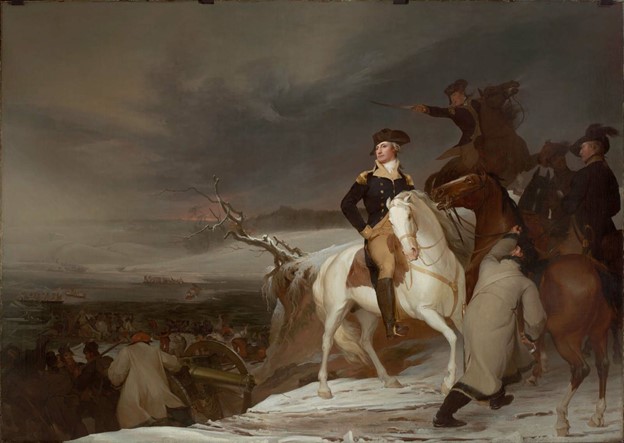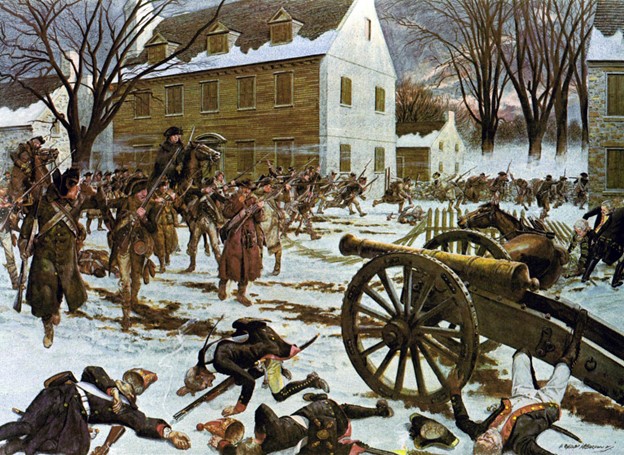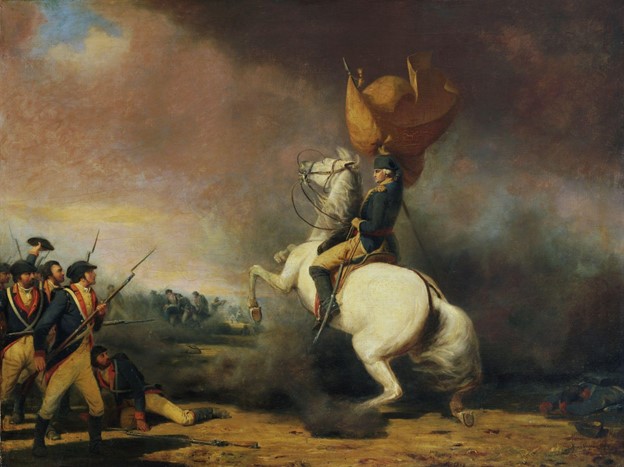Battlefield Chronicles: Washington Crossing the Delaware

The American Revolution did not start off the way the Americans had hoped. By Christmas night, 1776, morale was lower than it had ever been. The British Army had captured New York the previous summer, and men were beginning to desert as Washington's Army camped across the Delaware River from occupied Trenton, New Jersey.
 What men Washington had left were largely inexperienced, as most of the veterans from the Battle of Long Island went home when their enlistments were up. Even Washington himself was unsure of the near future. All was not lost, however. He did have a few factors in his favor.
What men Washington had left were largely inexperienced, as most of the veterans from the Battle of Long Island went home when their enlistments were up. Even Washington himself was unsure of the near future. All was not lost, however. He did have a few factors in his favor.
For starters, his forces outnumbered those of the Hessian mercenaries who occupied Trenton. He also had a solid intelligence source inside Trenton, providing information on the numbers, movements, and dispositions of the enemy. Washington decided to craft a perfectly-detailed attack that would surprise the Hessians and give the Americans a badly-needed win.
Washington decided to cross the river on Christmas night at three different locations, leading the largest contingent himself. The second force was to cross further south and create a diversionary assault on the town. A third column was to occupy the bridge just south of Trenton and prevent the Hessians from making a retreat.
Beginning their preparations on Dec. 23, 1776, Washington's Army just happened to have everything they needed to cross the river. In retreating from New York and New Jersey, the Americans brought watercraft with them during their retreat to prevent the British from using them. The Army also had experienced river pilots from New England among them, essential to navigating the perilous river. The local Pennsylvania Navy also came to help.
 The first casualty of Washington's crossing was the plan. By the time his force reached the crossing, Washington was already two hours behind schedule. His men, hungry and tired, had to march to even reach the crossing site. To make matters worse, the weather was turning on them. What had begun as a cold drizzle quickly became an icy nor'easter.
The first casualty of Washington's crossing was the plan. By the time his force reached the crossing, Washington was already two hours behind schedule. His men, hungry and tired, had to march to even reach the crossing site. To make matters worse, the weather was turning on them. What had begun as a cold drizzle quickly became an icy nor'easter.
Crossing the river was hazardous, considering the amount of floating ice and the sheer volume of men, horses, and artillery (18 pieces in all) that made the crossing difficult. It was so bad the other two columns didn't even make it across. The Army wasn't ready to move until 0400 that morning, and Washington was on his own.
He split his force into two and approached Trenton from two directions. The Hessians had been fighting random skirmishes with patriot militia in the days preceding Washington's surprise attack. When night came, they would be forced to exchange gunfire with unseen attackers, often falling prey to false alarms. The German troops were exhausted.
Given the weather, their commander, Johann Rall, determined that no one would make a surprise attack in the windy, blustering snow. He and his officers spent the evening drinking with the local postmaster, who was secretly a patriot supporter. When Washington attacked, Rall was drunk, tired, and unable to respond effectively.
 The patriot forces caught them completely by surprise, killing 22 (including Rall), wounding 83, and taking nearly 1,000 prisoners, along with a considerable supply of powder, weapons, and artillery.
The patriot forces caught them completely by surprise, killing 22 (including Rall), wounding 83, and taking nearly 1,000 prisoners, along with a considerable supply of powder, weapons, and artillery.
At a time when European armies entered quarters for the duration of the winter, Washington kept moving, which kept the British and Hessians on their heels. Although he retreated across the river that same day, American morale was restored, men began to re-enlist, and colonial support for the rebellion grew.
With his full Army, Washington next brought the fight to the British, mauling them at Assunpink Creek and Princeton on successive days before going to winter quarters in January 1777. By Spring, even more men had joined the new patriot army.